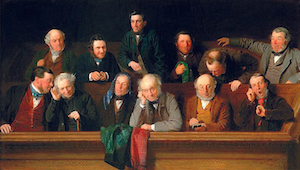 Libel cases in England and Wales are “better off without juries”, according to Sir Mark Warby, the High Court judge with responsibility for the Media and Communications List of the Queen’s Bench Division. As reported yesterday in the Brief, the legal newsletter of The Times, he was speaking on Tuesday at the London conference of the Media Law Resource Centre, an American organisation. He said that he “does not regret the passing of the jury at all”, and he pointed out (pdf) that there are many advantages to the “virtual abolition” of juries in defamation cases:
Libel cases in England and Wales are “better off without juries”, according to Sir Mark Warby, the High Court judge with responsibility for the Media and Communications List of the Queen’s Bench Division. As reported yesterday in the Brief, the legal newsletter of The Times, he was speaking on Tuesday at the London conference of the Media Law Resource Centre, an American organisation. He said that he “does not regret the passing of the jury at all”, and he pointed out (pdf) that there are many advantages to the “virtual abolition” of juries in defamation cases:
It has removed the territorial disputes that quite often used to arise, over whether a given issue is within the province of the judge, or that of the jury. In addition, this reform has all but eliminated the practice of arguing the same point to different threshold standards on different occasions. It is now possible for many more cases to reach a final resolution more economically by early judicial decisions on key issues of fact, or mixed issues of law and fact.
In England and Wales, section 11 of the Defamation Act 2013 provides that defamation actions are to be tried without a jury unless the court orders otherwise. It is interesting to see the judge in charge of the relevant list welcome this development so warmly; and it is a reform I think that Irish law could with profit adopt, not only for the reasons of efficiency which Sir Mark provides, but also because it could contribute to the reduction of high damages awards. It is a matter I have already recommended (pdf) to the review of the Defamation Act 2009 (also here) currently being conducted by the Department of Justice. Indeed, as the submission (pdf) from the Department of Communications, Climate Action and the Environment to that process observed:
Among the most pressing difficulties … with defamation action jury trials are:
• The unpredictability of juries;
• The high level of damages that they may award;
• The length of the trial period creating an increased costs in jury trials; and
• The complexity of the law in relation to a jury trial.The level of damages in defamation cases remains a concern to the media sector and to stakeholders. A trial by jury increases legal costs and lengthens the time of each case.
That submission recommended that the lead in England and Wales be followed, as did the Department of Journalism (pdf) in the School of Media, Dublin Institute of Technology, the Business Journalists’ Association(pdf), Google (pdf), MGN (pdf), NewsBrands Ireland (pdf), and Ronan Daly Jermyn (pdf).
The submission (pdf) from Independent News and Media pointed out that jury trial in defamation cases “is also out of line with other civil law cases where juries are not used”, and recommended their abolition, without any reference to the power of the court to decide otherwise. Local Ireland (the promotional brand of the Regional Newspapers and Printers Association of Ireland) made a similar submission (pdf), as did Kieran Fitzpatrick (pdf), and the Public Relations Institute of Ireland (pdf).
The Irish Times recommended (pdf) the abolition of juries in defamation cases, if not generally, then at a minimum in the determination of damages, as did Michael Williams (pdf) and the Press Council (pdf).
On the other hand, Johnsons Solicitors (pdf) firmly recommended that the presumption in favour of a jury trial should be retained in High Court cases; and other solicitors who responded to the Law Society’s call for comments also recommended (pdf) that juries be retained, as they are best placed to assess impact and also act as a deterrent to the more extreme excesses of the media.
If the jury is to be retained, then the Bar Council (pdf), the Joint Oireachtas Committee on Justice and Equality (pdf), McCann Fitzgerald (pdf), the National Union of Journalists (pdf), RTE (pdf), and William Fry (pdf), all recommended that, having regard to the decision of the Court of Appeal in Higgins v Irish Aviation Authority [2016] IECA 322 (04 November 2016), the jury should not be included in the offer of amends procedure in sections 22 and 23 of the 2009 Act (also here and here).
So, many views have been submitted to the Department, with the usual suspects making the usual arguments: media organisations and their lawyers arguing against juries, with plaintiffs’ lawyers arguing in favour. What’s most striking to me, though, is that the more disinterested observers also argue for the abolition of juries in defamation cases. And their views are reinforced by Warby J’s comments. On balance, therefore, I think that it’s time to abolish juries in defamation cases; (here’s how); and I hope that the current review will do just that.
One Reply to “It’s time to abolish juries in defamation cases”